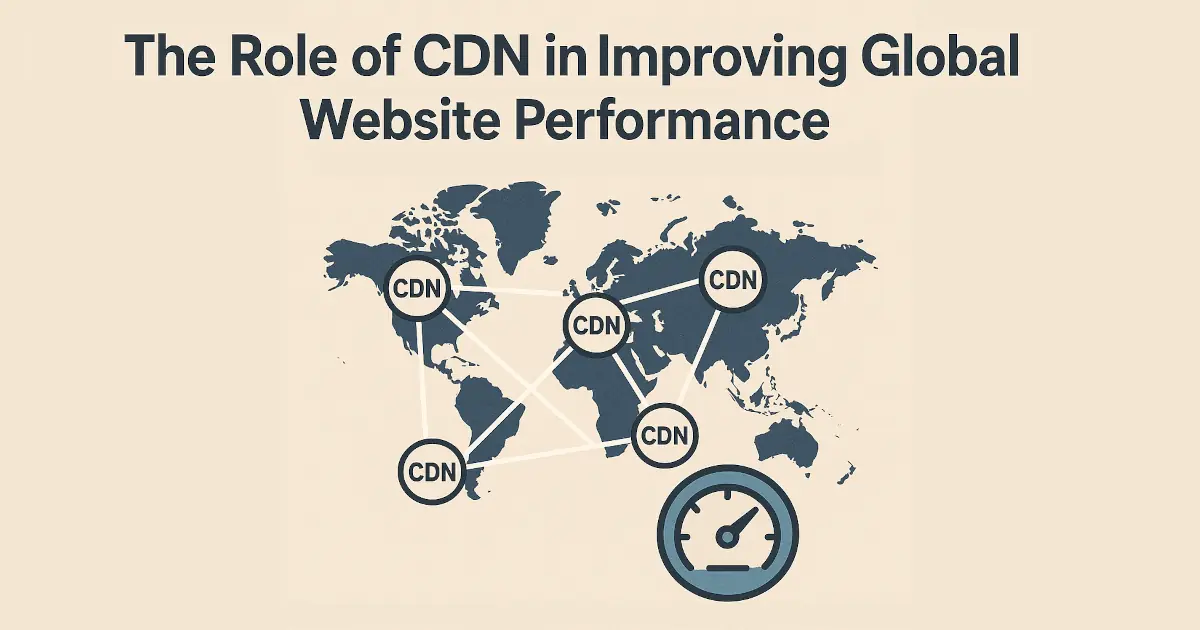In today’s digital landscape, website speed and reliability are critical for user experience, SEO rankings, and business success. One of the most effective ways to enhance global website performance is by using a Content Delivery Network (CDN). But what exactly is a CDN, and how does it work?
In this article, we’ll explore:
✔ What a CDN is and how it functions
✔ Key benefits of using a CDN
✔ How CDNs improve website speed and reliability
✔ Who should use a CDN?
A Content Delivery Network (CDN) is a distributed network of servers located in multiple data centers around the world. Instead of relying on a single origin server, a CDN stores cached copies of your website’s static content (images, CSS, JavaScript, videos) on servers closer to users, reducing latency and improving load times.
1. User Requests Content – When someone visits your website, their request is routed to the nearest CDN server (also called an "edge server").
2. Edge Server Delivers Cached Content – If the content is cached, the CDN serves it instantly. If not, it fetches it from the origin server and caches it for future requests.
3. Faster Load Times – Since the data travels a shorter distance, the website loads much faster for the user.
A CDN reduces the physical distance between users and your website’s content, significantly decreasing latency. Studies show that even a 1-second delay can lead to a 7% drop in conversions (Akamai).
If your audience is spread across different continents, a CDN ensures fast load times for users in Europe, Asia, the Americas, and beyond—without requiring multiple hosting servers.
By caching static content, CDNs offload traffic from your main server, reducing bandwidth consumption and preventing crashes during traffic spikes.
Many CDNs offer built-in security features like:
• DDoS Mitigation – Protects against large-scale attacks.
• Web Application Firewalls (WAF) – Blocks malicious traffic.
• SSL/TLS Encryption – Ensures secure data transfer.
Google considers page speed a ranking factor. Faster websites rank higher, leading to more organic traffic.
✔ E-commerce websites – Faster load times = higher conversions.
✔ Blogs & news sites – Improved global reach.
✔ SaaS & web apps – Lower latency for users worldwide.
✔ Streaming & media sites – Smooth video delivery.
BunnyCDN (Affordable & fast) - what we use and implement for our clients
Cloudflare (Free & premium plans)
Akamai (Enterprise-grade CDN)
Amazon CloudFront (AWS integration)
Fastly (Real-time caching)
A CDN is essential for any website with a global audience or performance needs. By reducing latency, improving security, and cutting bandwidth costs, CDNs ensure a seamless experience for users worldwide.
Is your website using a CDN yet? If not, it’s time to consider integrating one for faster, more reliable performance.
In this article, we’ll explore:
✔ What a CDN is and how it functions
✔ Key benefits of using a CDN
✔ How CDNs improve website speed and reliability
✔ Who should use a CDN?
What is a CDN?
A Content Delivery Network (CDN) is a distributed network of servers located in multiple data centers around the world. Instead of relying on a single origin server, a CDN stores cached copies of your website’s static content (images, CSS, JavaScript, videos) on servers closer to users, reducing latency and improving load times.
How Does a CDN Work?
1. User Requests Content – When someone visits your website, their request is routed to the nearest CDN server (also called an "edge server").
2. Edge Server Delivers Cached Content – If the content is cached, the CDN serves it instantly. If not, it fetches it from the origin server and caches it for future requests.
3. Faster Load Times – Since the data travels a shorter distance, the website loads much faster for the user.
Key Benefits of Using a CDN
1. Faster Website Loading Speeds
A CDN reduces the physical distance between users and your website’s content, significantly decreasing latency. Studies show that even a 1-second delay can lead to a 7% drop in conversions (Akamai).
2. Improved Global Performance
If your audience is spread across different continents, a CDN ensures fast load times for users in Europe, Asia, the Americas, and beyond—without requiring multiple hosting servers.
3. Reduced Server Load & Bandwidth Costs
By caching static content, CDNs offload traffic from your main server, reducing bandwidth consumption and preventing crashes during traffic spikes.
4. Enhanced Security (DDoS Protection & HTTPS Support)
Many CDNs offer built-in security features like:
• DDoS Mitigation – Protects against large-scale attacks.
• Web Application Firewalls (WAF) – Blocks malicious traffic.
• SSL/TLS Encryption – Ensures secure data transfer.
5. Better SEO Rankings
Google considers page speed a ranking factor. Faster websites rank higher, leading to more organic traffic.
Who Should Use a CDN?
✔ E-commerce websites – Faster load times = higher conversions.
✔ Blogs & news sites – Improved global reach.
✔ SaaS & web apps – Lower latency for users worldwide.
✔ Streaming & media sites – Smooth video delivery.
Popular CDN Providers
BunnyCDN (Affordable & fast) - what we use and implement for our clients
Cloudflare (Free & premium plans)
Akamai (Enterprise-grade CDN)
Amazon CloudFront (AWS integration)
Fastly (Real-time caching)
Conclusion
A CDN is essential for any website with a global audience or performance needs. By reducing latency, improving security, and cutting bandwidth costs, CDNs ensure a seamless experience for users worldwide.
Is your website using a CDN yet? If not, it’s time to consider integrating one for faster, more reliable performance.

